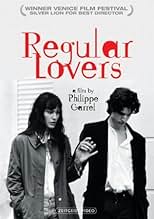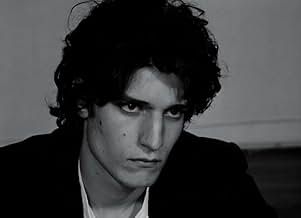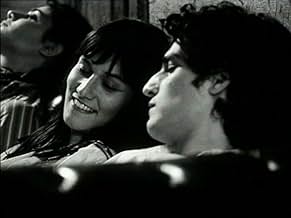AVALIAÇÃO DA IMDb
6,8/10
3,1 mil
SUA AVALIAÇÃO
Depois da Revolução de 68, um jovem poeta entrega-se ao vício do ópio e integra um grupo inconstante que vive das lembranças da revolução. Ele acaba se apaixonando por outra jovem do grupo e... Ler tudoDepois da Revolução de 68, um jovem poeta entrega-se ao vício do ópio e integra um grupo inconstante que vive das lembranças da revolução. Ele acaba se apaixonando por outra jovem do grupo e eles enfrentam a necessidade de amadurecimento.Depois da Revolução de 68, um jovem poeta entrega-se ao vício do ópio e integra um grupo inconstante que vive das lembranças da revolução. Ele acaba se apaixonando por outra jovem do grupo e eles enfrentam a necessidade de amadurecimento.
- Direção
- Roteiristas
- Artistas
- Prêmios
- 7 vitórias e 5 indicações no total
- Direção
- Roteiristas
- Elenco e equipe completos
- Produção, bilheteria e muito mais no IMDbPro
Avaliações em destaque
The first 60 minutes of 'Regular Lovers' is highly recommended. The first long sequence depicts the street riots in Paris of 1968, and are extremely convincing in the combination of random images and sounds.
After such a promising start, it's downhill... For another 2 hours the 'story' dwells on a tedious and passionless relationship between two young artists. Unnecessarily extended shots with no action or dialogue are little more than insipid imitations of Godard's style, without his wit or intelligence. They add nothing to this particular film I'm afraid.
I love the nouvelle vague, don't get me wrong, but this film mimics 'avant-garde' techniques to end up with the equivalent of an endless Calvin Klein advertisement - bored and handsome youths lolling about, being decadent and looking so photogenic. It needs much more dynamism and emotion, either in the acting or in the editing. It might have made a tolerable 2 hour film, and perhaps more involving for this audience member.
After such a promising start, it's downhill... For another 2 hours the 'story' dwells on a tedious and passionless relationship between two young artists. Unnecessarily extended shots with no action or dialogue are little more than insipid imitations of Godard's style, without his wit or intelligence. They add nothing to this particular film I'm afraid.
I love the nouvelle vague, don't get me wrong, but this film mimics 'avant-garde' techniques to end up with the equivalent of an endless Calvin Klein advertisement - bored and handsome youths lolling about, being decadent and looking so photogenic. It needs much more dynamism and emotion, either in the acting or in the editing. It might have made a tolerable 2 hour film, and perhaps more involving for this audience member.
It's not like an historical movie, it's not a movie with unforgettable love stories, it's not a movie with a spectacular scenario, but i can surely say it's a movie with a great atmosphere...
It had that 60's kind of bohemian and rebellious spirit: a group of friends living in a poor apartment in Paris, each one making art, dreaming of changing the world, doing drugs and loving in his very own way.
It takes a lot of patience to watch, and a special mood, that if you're not in, you might find it extremely boring and dull.
I liked a lot the very realistic approach of the events that took place and their immediate effect on student's lives: the fear for their future, the difficulty of earning their living, the obstacles in following their dreams.
What i absolutely loved was the black & white image. The still camera angles were amazing, they were like freezing moments. It left me the impression of a long slide show of old and very emotive and suggestive photographs. I actually had to see the movie again, just to take those amazing screen-shots.
In one word: beautiful...
It had that 60's kind of bohemian and rebellious spirit: a group of friends living in a poor apartment in Paris, each one making art, dreaming of changing the world, doing drugs and loving in his very own way.
It takes a lot of patience to watch, and a special mood, that if you're not in, you might find it extremely boring and dull.
I liked a lot the very realistic approach of the events that took place and their immediate effect on student's lives: the fear for their future, the difficulty of earning their living, the obstacles in following their dreams.
What i absolutely loved was the black & white image. The still camera angles were amazing, they were like freezing moments. It left me the impression of a long slide show of old and very emotive and suggestive photographs. I actually had to see the movie again, just to take those amazing screen-shots.
In one word: beautiful...
Seeing Les Amants Reguliers calls immediately for comparison with Bertolucci's movie 'The Dreamers', in my opinion the best film made about the 1968 revolt of students in Paris. Actually director Philippe Garrel does not seem to avoid comparing with his much more famous colleague, sharing the principal actor and even including a direct replica eye-in-viewer-eye about an older film of Bertolucci. And yet, LAR is a different film, and an interesting one.
The story line seems also familiar. The movie starts with long scenes of the 1968 'emeutes', maybe among the best done until now. The film is made in black-and-white, and the perspective of the static camera on one side or the other of the barricade reminds Eisenstein. Then, as in The Dreamers, the action moves in the Parisian flat where the heroes of the defeated revolt make art, smoke drugs, dream, and fall for one other. There is no direct social comment, no real explanation of the background of the revolt. The movie focuses on the psychology of the characters and on the love story between the main characters. It's like a premonition of the process of transition to the establishment that the generation of the 1968 went through, it's just that not all the participants may adapt or survive.
The film is more about the characters than about the events. And it is merely for the style it will be remembered about. The black-and-white cinema is memorable not only in the revolution scenes, but also when looking at the characters evolution. Many sequences are enhanced by a technique that is derived from the silent films movies, with long takes accompanied by a off piano tune. The effect is exquisite. Yet the length of the film is hardly justified, it lasts more than three hours and I doubt that cutting it to only two hours would have been a miss - actually I am convinced it's quite a contrary.
Without raising at the depth and subtlety of Bertolucci's movie LAR is another perspective to remember about one of the more important years in the history of France and of the world in the 20th century.
The story line seems also familiar. The movie starts with long scenes of the 1968 'emeutes', maybe among the best done until now. The film is made in black-and-white, and the perspective of the static camera on one side or the other of the barricade reminds Eisenstein. Then, as in The Dreamers, the action moves in the Parisian flat where the heroes of the defeated revolt make art, smoke drugs, dream, and fall for one other. There is no direct social comment, no real explanation of the background of the revolt. The movie focuses on the psychology of the characters and on the love story between the main characters. It's like a premonition of the process of transition to the establishment that the generation of the 1968 went through, it's just that not all the participants may adapt or survive.
The film is more about the characters than about the events. And it is merely for the style it will be remembered about. The black-and-white cinema is memorable not only in the revolution scenes, but also when looking at the characters evolution. Many sequences are enhanced by a technique that is derived from the silent films movies, with long takes accompanied by a off piano tune. The effect is exquisite. Yet the length of the film is hardly justified, it lasts more than three hours and I doubt that cutting it to only two hours would have been a miss - actually I am convinced it's quite a contrary.
Without raising at the depth and subtlety of Bertolucci's movie LAR is another perspective to remember about one of the more important years in the history of France and of the world in the 20th century.
This is the best French movie of the year ! I saw it twice and I found it great both times. I didn't think it boring at all even though it is very long (3 hours). I'm seventeen so I obviously didn't get to live the events of may 1968 that marked an extremely important turn in French history, but it doesn't really matter since I still really enjoyed the film. It's actually quite universal : people of my parents' age can identify to the characters and so can people my age. Garrel seems to perfectly understand young people, the way they think and the complications of love as well as the loss of illusions concerning the possibility of changing the world. Maybe that's because the character played by Louis Garrel (his son)is actually meant to represent Philippe Garrel himself. Well anyway, great movie, no action (have to be honest on that point) but so strong feelings that you can't possibly stay indifferent to it. If you're looking for a relaxing Sunday-evening movie, don't waste your time on this, you'll be disappointed. But if you like cinema, you'll like Les Amants Réguliers which is a bewitching movie close to those made in the 50's and 60's by the Nouvelle Vague artists.
Philippe Garrel makes us breathe the forgotten atmosphere of the Nouvelle Vague, almost lost among the vestiges of its ancient splendor but ready to rise again from its ashes if recalled from the past. They who are a little acquainted with the director's subjects, on the other hand, may know very well how he's obsessed by a lingering sense of loss as far as fickleness of reality is concerned. "Les amants réguliers", therefore, show us the parallel stories of an "amour fou" and of a tempted revolution gone to ruin under the direction of young French students.
The first part of the story is about the dramatic events of May '68 in France evoked in a series of astonishing plan-sequences, a sort of cinema verité style, that place the student insurrection in anything but an enviable light against a pitch-black background.
There's much that can be said about the peculiarities of black-and-white photography used to describe the battle between students and police, where the high contrasts confer an unrealistic atmosphere to the sequences and darkness closes in upon the excited bodies wrapping them in mystery. The images, completely deprived of words, show the real consistence of the myth, made of crude violence, more and more emphasized by the exasperated reality of the movie shootings. The individual doesn't count anything at all here: he tends to disappear in the mass. What really matters in these fight scenes are the significance of the mass-suggestion, the blind fury of the juvenile assault, sinister eulogies of the power of the mob, even if conceived like separate entities apart from any kind of emotion, with the cold and distant look of an entomologist intent to catalog his insect collection.
The second part of the story is described in a quieter and most intimate way. Stands out on the horizon the distressing portrait of a self-centered generation in search of its lost time, completely disenchanted about the individual values of men, inclined to rotate on its own axis between opium fumes and making a funeral oration in the praise of its recent defeat.
"Les amants réguliers" seems to evoke from time to time the shadow of the great Robert Bresson, revised and corrected by Garrel's particular sensibility without drifting away from the main argument, trying to expand overall perspectives on the subject of human disillusions that though painful may bring us to the truth. In my opinion, trying to penetrate deeply into the substrate of the story, if a man lets himself go and play things by ear, he probably will find that he can bring out the dark side of his self with dire and irretrievable consequences.
The first part of the story is about the dramatic events of May '68 in France evoked in a series of astonishing plan-sequences, a sort of cinema verité style, that place the student insurrection in anything but an enviable light against a pitch-black background.
There's much that can be said about the peculiarities of black-and-white photography used to describe the battle between students and police, where the high contrasts confer an unrealistic atmosphere to the sequences and darkness closes in upon the excited bodies wrapping them in mystery. The images, completely deprived of words, show the real consistence of the myth, made of crude violence, more and more emphasized by the exasperated reality of the movie shootings. The individual doesn't count anything at all here: he tends to disappear in the mass. What really matters in these fight scenes are the significance of the mass-suggestion, the blind fury of the juvenile assault, sinister eulogies of the power of the mob, even if conceived like separate entities apart from any kind of emotion, with the cold and distant look of an entomologist intent to catalog his insect collection.
The second part of the story is described in a quieter and most intimate way. Stands out on the horizon the distressing portrait of a self-centered generation in search of its lost time, completely disenchanted about the individual values of men, inclined to rotate on its own axis between opium fumes and making a funeral oration in the praise of its recent defeat.
"Les amants réguliers" seems to evoke from time to time the shadow of the great Robert Bresson, revised and corrected by Garrel's particular sensibility without drifting away from the main argument, trying to expand overall perspectives on the subject of human disillusions that though painful may bring us to the truth. In my opinion, trying to penetrate deeply into the substrate of the story, if a man lets himself go and play things by ear, he probably will find that he can bring out the dark side of his self with dire and irretrievable consequences.
Você sabia?
- CuriosidadesClémentine Poidatz's debut.
- Erros de gravaçãoA Volvo 66 is featured prominently during the riot scenes in the beginning of the film. The production of this model hadn't begun until 1975.
Principais escolhas
Faça login para avaliar e ver a lista de recomendações personalizadas
- How long is Regular Lovers?Fornecido pela Alexa
Detalhes
Bilheteria
- Faturamento bruto mundial
- US$ 125.381
- Tempo de duração
- 3 h 3 min(183 min)
- Cor
- Mixagem de som
- Proporção
- 1.37 : 1
Contribua para esta página
Sugerir uma alteração ou adicionar conteúdo ausente













